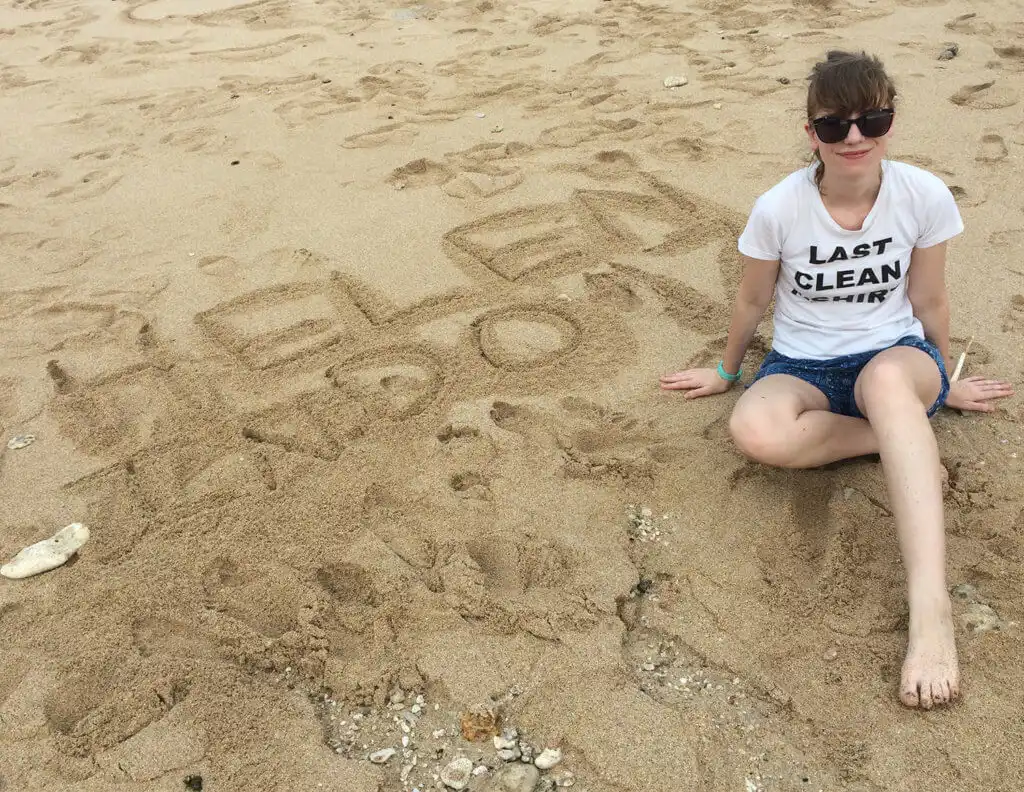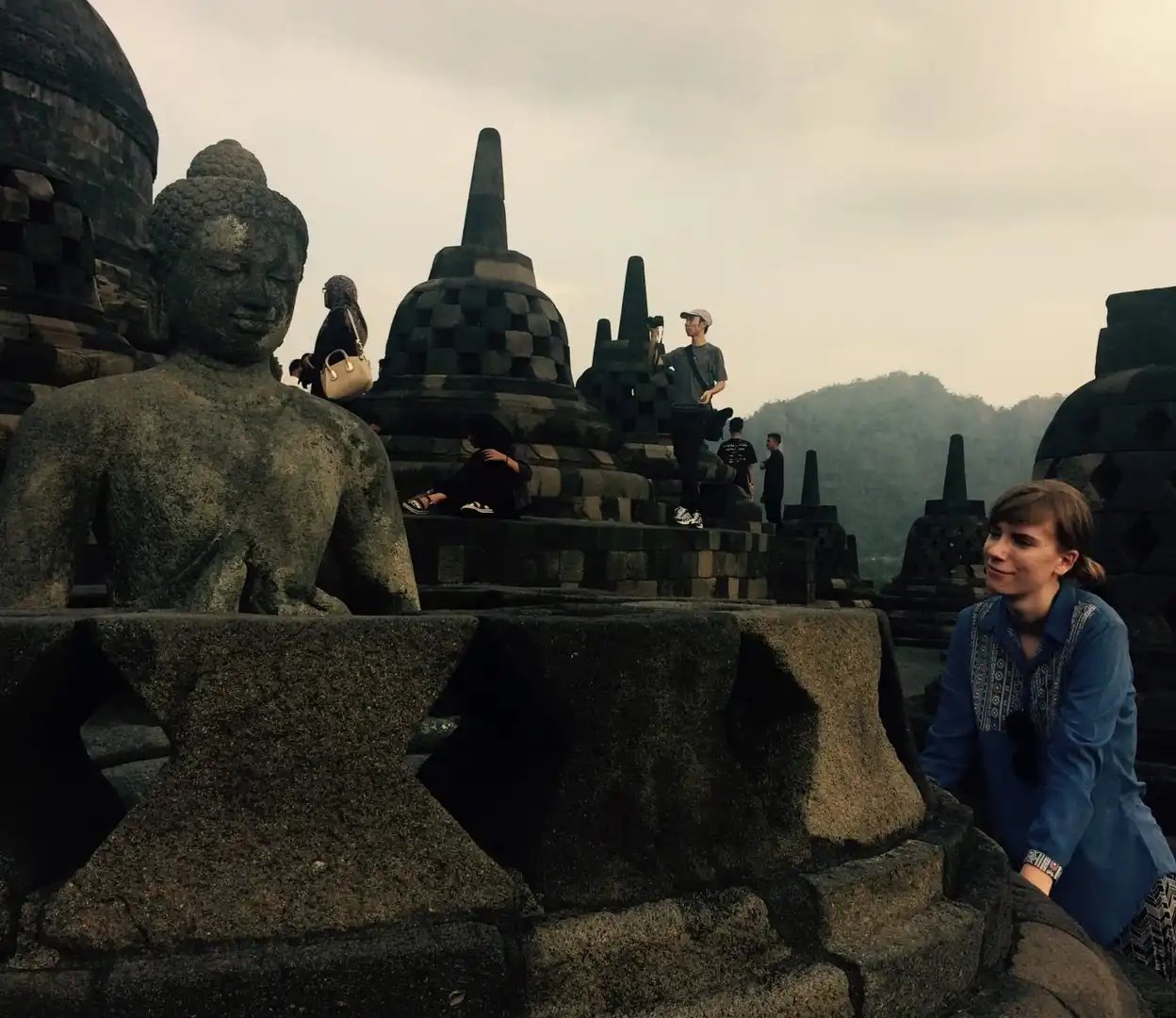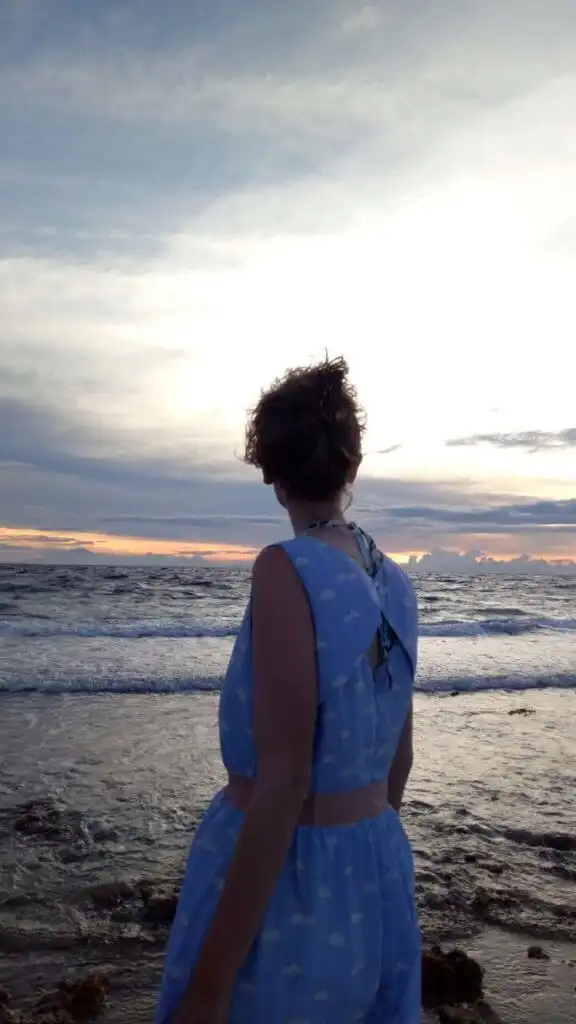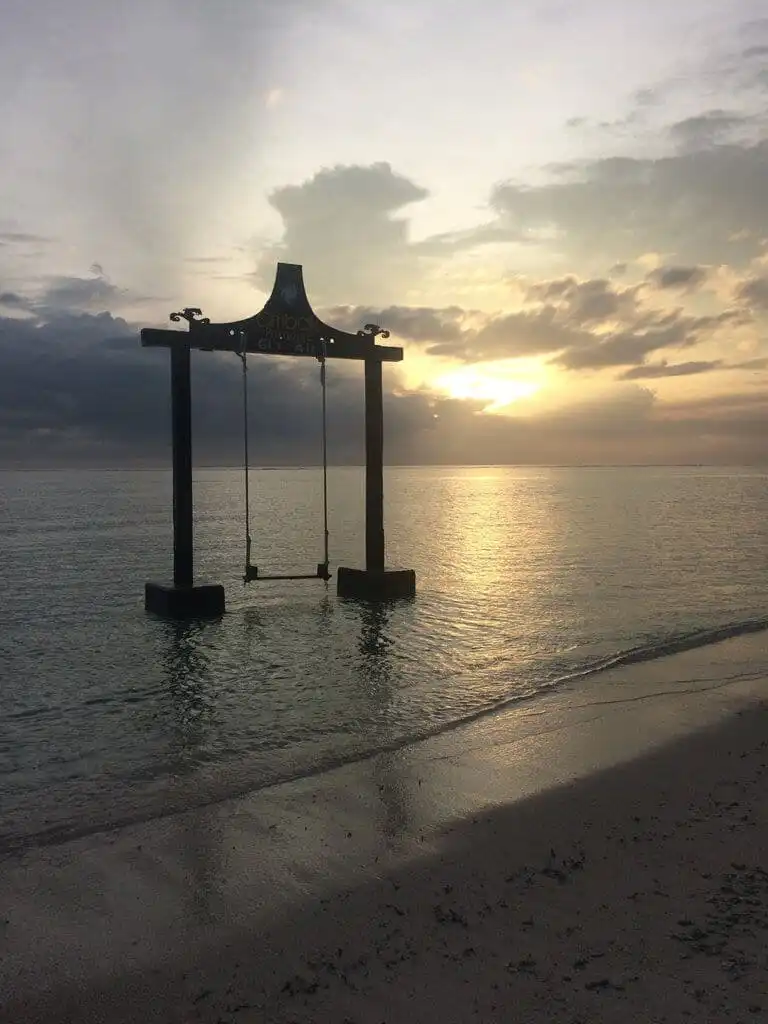
An Adventure in Indonesia: Helen’s Story
When I travel, I have one rule: I say no to anything I wouldn’t want my sister to do. I hope she would say yes to teaching English as a foreign language, maybe in Indonesia…
At the end of that fateful year, 2016, I gained my Teaching English as a Foreign Language certificate for 120 hours of online and classroom study - I was free to travel the world as an English language teacher! Hoping that the next year would be much better than the last, I looked through the vacancies on TEFL.com . I had lived in India and New Zealand recently and decided I wanted to work somewhere without any British imperial influence. I looked at Vietnam and Indonesia, as I hoped to save enough to travel around Australia afterwards (I’m currently writing this from a cafe in Melbourne). Through my research, I liked the multicultural values of Indonesia and I already knew I liked chicken satay. Following the furore of Brexit, I wondered what this country of 17,000 islands underlying the equator and with the highest population of Muslims in the world could teach me. I submitted an application and had a Skype interview, which went very well and my gut told me to go for it.
Some of my friends and family members assumed the whole country outside of Jakarta would be like the Instagram photos they had seen of Bali, “You’re doing your own eat-pray-love?!” But others were not too excited for me. Like England, Indonesia has suffered from violent acts of terrorism, including the 2002 Bali bombings. Images of the ravaged Sumatra island following the 2004 Boxing Day tsunami were also imprinted on the minds of many whom I shared my news with.
Repeatedly, I was told how brave I was for teaching and travelling. Yet for me, being brave would mean staying in my hometown for my whole life and not seeing the rest of the planet.
I was met by a colleague at Jakarta airport (via Dubai, another exciting and possible TEFL destination) and taken to my new home, in a gated community, close to the school and a small mall. The house was complete with a housekeeper, neighbourhood pool and a rooftop garden. I began teaching with four other young women and we hit the ground running together. As a foreigner however, I was taken on a trip to the hospital to prove I was drug-free, not pregnant and sane - a requirement of my Indonesian working visa (hey, I ticked all the boxes). The first few months passed in a haze of introductions, documents and new types of food. My colleagues took me under their wing and I soon had a wide circle of friends and friends of friends. I joined the gym and found a daily dance class that enormously improved my energy (and homemade ice coffee).
To be on best teaching form, I began doing morning exercises. I arrived feeling more awake, alert and excited to start the day! Teaching should not be done from a chair at the front of class. If you arrive in class looking or even feeling lazy, it’s all over. Teachers need to speed around, peer over your pupils’ shoulders, invite them to write on the board, read their work, run after runaways - and possibly beat a cockroach to death with a waste paper basket (one way to earn students respect…).
Write a list of all of the best and worst qualities you found in your teachers - keep a spare deodorant and breath mints in your staffroom desk. Don’t take students comments to heart, but do listen to their feedback if given sincerely and without emotion. Learn from what works and what doesn’t. I had instances where carefully laid lesson plans tanked and where spontaneous ideas delighted pupils for over an hour. This may be 2018, but still - do not allow your lesson to stand on technology alone. Computers can crash, but pen and paper will always be at hand. Have a standard gap-filler exercise ready for every lesson, just in case.
Throughout my year-long stay, I pottered around Java island visiting nearby Bogor three times, Yogyakarta - home of the famed Borobordor temples and Serang, where I enjoyed fresh mangos from the trees at my friend’s house. The availability of fruit across the whole year was a total joy! After a three-hour boat ride to Tidung Island, north of Java, I spent New Year’s Eve cycling under palm trees on the car-free island and tried snorkeling - something I felt was probably overrated. I was totally wrong. At the end of my contract, I visited Lombok and discovered coconut and brown sugar pancakes, then went onto the three Gili Islands: Air, Meno and Trawangan. You can skip Gili Meno unless you’re on your honeymoon and Gili T felt was like Disneyland for adults at the seaside. Gili Air was a happy medium of the best of the two and hopefully will not be so completely overrun by tourism as its next door neighbour, Bali. I was mournfully told by my colleagues that Bali has lost its charm in recent years due to the swathes of tourists and plastic pollution, so I decided to skip it. A colleague from a neighbouring country also shot down my aspirations of visiting his homeland, by bluntly telling me it was boring and dirty. If you choose to travel through the country you visit (do!), be sure to ask your colleagues for ideas of where and when to go. They will most likely be delighted to give you a hit list, a miss-list and maybe even contacts.
 The negatives - and how to beat them
The negatives - and how to beat them
My legs were a feast for the local mosquitos. No amount of pest control spray seemed to deter them from my O+ blood. So I resorted to longer sleeves and full length trousers, which if baggy and lightweight are incredibly comfortable in the heat and protective from the sun.
The heat however, was persistent. In one lesson, I taught a group of 7-8 year olds about the seasons and when explaining winter, one child drew her arms up around herself and shivered in absolute horror. Aside from being asked if you have met Ed Sheeran or Harry Styles (if you have… cover your ears when you announce that), students will want to know all about winter, autumn and spring. I did miss the seasons, but I have found that now I’m in Australia, I’m really excited for winter! The things you miss during your placement will be special when you get to experience them again later.
I have been told that I have a fairly eccentric style (I made a skirt out of an old laundry bag, ok?) and have always been able to ignore being stared at. If you’re not comfortable with double-glances, outright staring, mouths agape and pointing, you can either stick to TEFL in Europe or brace yourself and embrace it! Locals are inquisitive and the staring was never aggressive, just curious, so smile and say “Hello” or drop some of the local language and really make an impression.
However, this would sometimes lead to a travel experience that I loathed, even though I always said yes. It gives me anxiety to discuss, because of Agatha (I’ll explain her later) so please excuse me if this offends you… here it is: in the supermarket queue, at the park, outside of the toilets, in the swimming pool changing room, at the gym, at museums, at the top of Borobudur and while in Hush Puppy shopping for a new work-shirt, I was asked for a selfie. Why? I would always think, nervously shrugging and nodding. Had they confused me with someone famous? Or was me being white so interesting that it would make a good Facebook status? No one ever explained this, introduced themselves or asked me for my name, leaving me feeling used and confused. But I was always thanked and the appreciation was clear. I did a little research, chatted to my Indonesian friends and decided that while I might have been mistaken for Taylor Swift, the easiest answer was that I was simply the first white woman they had ever seen. Donald Trump came up in classroom conversations every few weeks and it was never positive. You don’t need to play diplomat, but politics will enter the classroom. Remember younger students are impressionable and you may have the chance to chip away any of their fears. I became aware that to my students and the people of Indonesia, I was representing all white women, white people, native English speakers and Westerners. So in and out of the classroom I strove to set a good example (undone by every Tweet sent by 45…) .I always smiled and said yes to photographs - even though I privately felt that me being white was of no interest or importance. If I had said no, that would have laid a less favourable impression of white people to the natives of my host country. My Indonesian friends thought the photographs all very silly and offered to be my security team - their humour got me through each experience but the cherry on the cake: some photographers asked my dear male friends if we were dating. As with everything, you can choose to say no. Reread that last sentence. But sadly, some people won’t ask you.
 Although I was never forced to do anything I didn’t want to, there were a few other occasions that felt morally dubious by my English standards, yet in Indonesia, were fully normal. A neighbour and her family took me out to lunch and the children did not wear their seat-belts, as we rode 90mph down the motorway. Censorship on television included blurring out Rose’s cleavage in the scene where she meets Jack in
Titanic
, yet the N-word was not blurred out on the radio. Sometimes it was spoken in the classroom. I would halt our activity and seat everyone on the floor.
Although I was never forced to do anything I didn’t want to, there were a few other occasions that felt morally dubious by my English standards, yet in Indonesia, were fully normal. A neighbour and her family took me out to lunch and the children did not wear their seat-belts, as we rode 90mph down the motorway. Censorship on television included blurring out Rose’s cleavage in the scene where she meets Jack in
Titanic
, yet the N-word was not blurred out on the radio. Sometimes it was spoken in the classroom. I would halt our activity and seat everyone on the floor. “That word - which begins with N and rhymes with “bigger” is a very bad word. If anyone says it in England, the police are called and they will be in big trouble!”
In contrast, there is also a lot of racial banter between the Indian-Indonesians, the Chinese-Indonesians and everybody else. At first I was horrified: “This is so racist! Unbelievable in a democracy!”, I indignantly whined as friends ping-ponged ethnicity jokes and cackled with laughter that was multiplied by my discomfort. It was explained to me by a friend with European roots that this is exactly the same kind of banter between the English and the Scottish, the English and the French, the English and the Americans. I sat in astonishment as I realised he was right. I did not join in with their jokes, but seeing them compared with my own culture, I found it easier to tolerate them.
My inner cultural imperialist - that’s Agatha, imagine Helen from Bridesmaids - who also heads my anxiety. She would shriek in complete horror at least once per day but grew quieter as the year went on. It is fine to feel shocked or angry at something you’ve been trained to perceive as wrong. That doesn’t make you imperialistic! But your reaction does. As a guest in your host country you have no right to object to how the people who live there live. Agatha was horrified at the idea of my photograph being taken, because taking a photo of an ethnic minority in England would probably lead to police intervention and an article in The Guardian. I made my rules, but I did have to adapt. I have invited all of my Indonesian friends to visit me in England at any time and I’m sure that there will be things that I do there without thinking that would shock or confuse them. This is the joy of travel - you have to rethink and explain everything you’ve learned in your home country and see a whole other side of existence.
Some colleagues were shy and would apologise to me if they accidentally stumbled and used incorrect English. I was always ready to reassure them: “You’re bilingual! I can count to five in Indonesian!” I felt deeply ignorant for my lack of language knowledge and tried to learn some Indonesian Bahasa, but my brain is about as absorbent as iron. This, at least, gave me a strong empathy and respect for my students and colleagues. However, through daily practice, I was able to remember a few everyday words and greetings. My most-used word in Indonesian bahasa? “Yoda”, meaning “whatever”… I also quickly learned “bule” (rhymes with “okay”), slang for “white foreigner”.
When walking alone, men would occasionally approach me, in a car or on a bike, and ask where I was going and if I wanted a lift. I gave the answer I would want my sister to give - a polite but firm no. If they persisted, Agatha would come out and answer - then I would continue walking. In your hometown and when travelling, do not feel guilty about saying no. Any decent, genuinely helpful person would understand and accept your refusal. If they try to make you feel guilty, you know you made the right choice.

Depending on you, this might be a positive or a negative, but I lost nearly a kilogram of weight each month. The heat was extraordinary and as such, I ate less and drank three litres of water a day. Also, alcohol in Indonesia is much harder to find. Supermarkets in the city usually sell beer, other beverages are far less common and I only ever saw them in clubs and high-class restaurants. Although not impossible to get, see what a dry year does for you. I don’t smoke, but cigarettes are cheaper and culturally acceptable, they smell much worse. Again, this is not impossible, but good luck finding any bacon or any sweets that contain gelatine. Good news is, there is a huge variety of fresh fruit to enjoy.
The positives - and how to get the most out themBy doing TEFL, you’ll experience huge personal development. This cannot be understated and yet I don’t even know where to begin. I’ll just say that the version of me who arrived in January 2017 experienced huge upgrades in areas where they were needed by the end of the year. When you remove yourself from a monotonous and comfortable environment and put yourself in a place where every day is an adventure and a challenge where you are constantly learning - you adapt magnificently. Remember, Cheryl Strayed says in Wild: “You can quit anytime”. You can. Or, like Bilbo Bagins, you can miss your home comforts and go on an adventure anyway. Because like Bilbo, I’m single. I’m also childless, I don’t have a mortgage and one day I might have all three of those things. I know now, that then, I won’t want to be miserable that I didn’t take a chance to grab life with both hands and have an adventure while I’m still fully independent!
For Christmas 2017, I visited a local Church and enjoyed humming along to familiar hymns. I went with the Christian sister and father of one friend - she and her mother are Muslim. After the service, all of the family and I went out to Pizza Hut for a Christmas meal (pizza - for Christmas!). I was stunned, humbled and so happy to be a witness to this unified and diverse family - and was invited back for this year! Experiences like this one are the real crown jewels of the travel diary.
My advice to any TEFL teacher in would be to experience the country you visit - everyday! Teaching can be tiring, it can be so easy to go from relaxing on a Saturday morning to spending the whole day on Instagram. Now that my year is spent, I regret those Saturdays and wish I had done more. Advertise to your colleagues that you want to see their country, especially local areas where you can do a day or afternoon trip. Some might feel embarrassed or confused (I know I’d struggle to show off my hometown!) but places they considered ordinary I would find fascinating. I remember driving slowly through the slums of Bogor and my jaw dropping when we passed by a house held together with bits of rope, bearing the most beautiful front garden. I was confronted with a dignity in poverty that I had never witnessed before. There are unique things for you to discover everywhere… At the beginning of your contract, ask to see a list of all of the public holidays and double-check your contracted holiday allowance. Make a note of this in your diary (essential for a teacher!) or calendar and plan your three-day weekend trips ahead of time.

Besides exploring further afield, find out what is going on in your area. During my stay, I joined a Bible study group, Mauy Thai and the gym and made more friends. Instead of going to the pub after work, me and my colleagues would go out for non-alcoholic drinks from a cafe round the corner or to a karaoke bar (even as a poor singer, I promise, this is a lot of fun after teaching!). Two friends and I started a Walking Dead marathon. I have witnessed people travelling to new places and just expecting new friends to fall into place - you have to make a move.
Also, social media brings me closer to my friends when I travel, but it also brings my online profile to my students. I was careful not to post anything which could compromise my authority in the classroom or my job. I never complained about my pupils, colleagues or my job and I never interacted with students online. If you get any pupils trying to add or follow you, don’t be tempted. Do not accept them. Reread that last sentence. OK? If asked why during a lesson, explain that this is written into your contract (it probably is). If a student persists or sends you personal messages anyway, get a witness and tell a senior colleague. Do not reply.If there is an unhappy event anywhere near you, reach your family and friends before the news does. My Mother joined Snapchat just to stay in immediate contact with me and Facebook has the Safety Check feature you can use if an even is considered serious enough. During my stay, I awoke early one morning to my wardrobe door banging side-to-side. To my everlasting credit as a lazy person, I remained in bed and fell back to sleep. When I had finished my ice coffee the next morning, I discovered on my BBC news app that there had been a small earthquake on the other side of Java island! I immediately messaged my family “I slept through my first earthquake!”, assuring them that I was safe and I did so again when the Bali volcano kept burping late last year. On 24th May 2017 I awoke to the news of a terrorist bombing at a nearby bus stop. I texted my family and put up a joint Instagram and Facebook status telling everyone that me, my friends and students were safe. However, my housekeeper (who I miss daily and not just for her housekeeping) told me mournfully that she frequented the bus stop in question when visiting her family in the countryside. Thinking that she could have been in danger made me livid, then even more determined to teach English abroad and represent coexistence, tolerance and unity through diversity.
There were some truly exhausting days, when I just wanted to kick back with a port and brandy, a packet of gelatine-filled gummy sweets and an episode of Poirot. But not one day ended with me googling a one-way ticket home.
I learned from another culture and I learned about my own capabilities. I learned that I’m more anxious than I’d like to believe and I’m working on that. I also discovered that I’m easily indignant, but I’m all right with that. Yoda.
Make sure to check out Helen's blog , Instagram , and Twitter to keep up with her adventures!